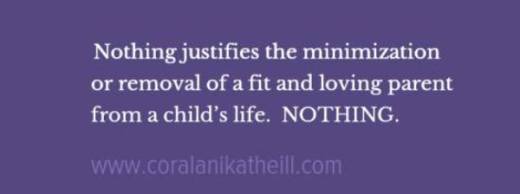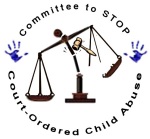

 In my YouTube video, Parental Alienation Syndrome Excerpts from Gregory Mantell Show, I have excerpted segments from an excellent discussion of Parental Alienation. This episode is from a weekly half-hour progam, the most successful talk show on the internet. “The Gregory Mantell Show” also airs on cable TV in Los Angeles and NYC. The episode’s discussion is comprehensive and features Dr. Jayne Major and police officer Catherine MacWillie. I have excerpted approximately 6 min from this 26 min segment. The excerpts will speak for themselves with one comment that I reserve at the end.
In my YouTube video, Parental Alienation Syndrome Excerpts from Gregory Mantell Show, I have excerpted segments from an excellent discussion of Parental Alienation. This episode is from a weekly half-hour progam, the most successful talk show on the internet. “The Gregory Mantell Show” also airs on cable TV in Los Angeles and NYC. The episode’s discussion is comprehensive and features Dr. Jayne Major and police officer Catherine MacWillie. I have excerpted approximately 6 min from this 26 min segment. The excerpts will speak for themselves with one comment that I reserve at the end.
Dr. Major emphasizes that the obsessed alienator is consumed with destroying the targeted parent’s relationship with the child. She concludes that the severely obsessed alienator is untreatable. Her comments include “They don’t bend;” ”It is winner take all for them;” “They have a very serious psychiatric problem.” “You can’t fix those people.”
 My experience corroborates her conclusion that severely obsessed alienators are untreatable, often sociopathic and narcissistic, unable to experience empathy or compassion for others, and unable to appreciate another person’s point of view, including that of their child. They feel entitled to destroy the targeted parent and as collateral damage, even harm their children.
My experience corroborates her conclusion that severely obsessed alienators are untreatable, often sociopathic and narcissistic, unable to experience empathy or compassion for others, and unable to appreciate another person’s point of view, including that of their child. They feel entitled to destroy the targeted parent and as collateral damage, even harm their children.
But Dr. Major – and many others – come to a common conclusion which I question. She and others conclude that obsessed alienators continue to spin elaborate falsehoods to the point that they actually come to believe their own fabrications.
We cannot read their minds. We cannot know what they actually believe. They lie. When a rapist, for example, elaborates a detailed, vivid account of his innocence, does that mean he really believes he wasn’t at the scene of the crime, or is he just spinning a convincing version of what he wants others to believe? If – as I think –parental alienators are sociopathic without conscience – how can anyone know the difference between what they actually think and what they say? Parental alienators lie about the targeted parent. They can be very convincing. They can even induce others to conclude that they actually believe their own fabrications.

I will relate a brief clinical vignette. Joe, not his real name, was convicted of spousal abuse and remanded by the court to a rehabilitation program for abusers. As part of the therapy, staff and patients participated in a dramatization about physical abuse between a husband and wife. A male staff member played the part of the abusive husband. When his stage wife complained that he had punched and hurt her, he apologized. Joe immediately stood up and instructed the stage husband, “Never, never apologize; never admit your responsibility.” I think Joe reveals something important. He is telling us that, as an abuser, he would not acknowledge his abusive behavior. That does not mean he lacks awareness of it – only that he would never acknowledge it.

The Child’s Participation in Parental Alienation

In divorce, how could a child be brainwashed or programmed by one parent to denigrate the other parent to the point, sometimes of outrageously vilifying and hating the targeted parent.
 Forensic psychiatrist Dr. Richard A. Gardner first identified Parental Alienation Syndrome (PAS) in the 1980’s. He observed that the disorder wasn’t just brainwashing or programming by a parent. It includes what Dr. Gardner calls self-created contributions by the child in support of the alienating parent’s campaign of denigration against the targeted parent.
Forensic psychiatrist Dr. Richard A. Gardner first identified Parental Alienation Syndrome (PAS) in the 1980’s. He observed that the disorder wasn’t just brainwashing or programming by a parent. It includes what Dr. Gardner calls self-created contributions by the child in support of the alienating parent’s campaign of denigration against the targeted parent.
Excerpted from: Gardner, R.A. (1998). The Parental Alienation Syndrome, Second Edition, Cresskill, NJ: Creative Therapeutics, Inc.
The child’s part in PAS
Gardner emphasizes that in PAS both the parent and the child contribute to the denigration of the targeted parent. The child has to actually participate in the process.
- The child denigrates the alienated parent with foul language and severe oppositional behavior.
- The child offers weak, absurd, or frivolous reasons for his or her anger.
- The child is sure of him or herself and doesn’t demonstrate ambivalence, i.e. love and hate for the alienated parent, only hate.
- The child asserts that he or she alone came up with ideas of denigration. He calls this the “independent-thinker” phenomenon in which the child asserts that no one told him to reject and vilify the targeted parent.
- The child supports and feels a need to protect the alienating parent.
- The child does not demonstrate guilt over cruelty towards the alienated parent.
- The child uses borrowed scenarios, or vividly describes situations that he or she could not have experienced.
- Animosity is spread to the friends and/or extended familyof the alienated parent.

In severe cases of parent alienation, the alienator can even truthfully say that the child doesn’t want to spend any time with this parent, even though he or she has told the child that visitation is ordered by the court. The alienator can say, “There isn’t anything that I can do about it. I’m not telling him that he can’t see you.”
The Escalating Levels of Parental Alienation (PA)
PAS has not developed if the child still has a positive relationship with the targeted parent, even though the other parent is attempting to alienate. This level of alienation may be called Parental Alienation (PA) but, without the child’s denigrating the targeted parent, it falls short of the full Parental Alienation Syndrome (PAS).
Dr. Douglas Darnall in his book Divorce Casualties: Protecting Your Children from Parental Alienation describes three categories of PA:
Moderate alienators more aggressively alienate. They get out of control and don’t want to admit it when they were.
Severe alienators are obsessed with absolutely destroying the other parent’s relationship with the child. Severe alienators are untreatable. They are sociopaths without guilt or conscience about destroying the other parent. Dr. Gardner believes the only effective management of obsessed alienators is removing the child from their influence.
 The courts have difficulty with PAS because traditional child abuse on the part of the alienating parent is unclear, especially when the child may be otherwise well cared for. On the other hand, PAS involves no true parental abuse and/or neglect on the part of the targeted, alienated parent. The child’s animosity is not justified.
The courts have difficulty with PAS because traditional child abuse on the part of the alienating parent is unclear, especially when the child may be otherwise well cared for. On the other hand, PAS involves no true parental abuse and/or neglect on the part of the targeted, alienated parent. The child’s animosity is not justified.
When parents first separate there is often parent alienation. A parent, for example, might communicate indirectly to a child the message that he or she is not safe with the other parent.

The alienating parent might say:
“If you get scared, you call me right away.”
“I’ll come get you if you want to come home.”
What motivates a parent to undertake PAS?
 PAS parents tend to be narcissistic (self-centered) and sociopathic (lacking moral conscience). They experience a significant narcissistic blow from the failure of the marriage, and they feel entitled to absolutely destroy the child’s relationship with the other parent. To accomplish this, they must essentially assume total control over their child. They may appear to love their children, but this is only an appearance. To the alienator, the children are merely possessions – much like a “beloved” teddy bear is. If “Teddy” were to come to life and actually assert himself, the alienator might toss him into the closet. Alienators are unable to see the child as a separate from themselves. Possession is not real love. Truly loving parents don’t need to do a parentectomy on their child (assuming no actual abuse has taking place). But alienators feel entitled to lie.
PAS parents tend to be narcissistic (self-centered) and sociopathic (lacking moral conscience). They experience a significant narcissistic blow from the failure of the marriage, and they feel entitled to absolutely destroy the child’s relationship with the other parent. To accomplish this, they must essentially assume total control over their child. They may appear to love their children, but this is only an appearance. To the alienator, the children are merely possessions – much like a “beloved” teddy bear is. If “Teddy” were to come to life and actually assert himself, the alienator might toss him into the closet. Alienators are unable to see the child as a separate from themselves. Possession is not real love. Truly loving parents don’t need to do a parentectomy on their child (assuming no actual abuse has taking place). But alienators feel entitled to lie.
Narcissistic alienating parents presume that they have special entitlement. They think that rules apply only to other people.
In spite of admonitions from judges and mental health professionals to stop their alienation, they can’t. The prognosis for severely alienating parents is very poor. It is unlikely that they will stop trying to perpetuate the alienation. It is virtually a survival issue to them.
Gardner observed that alienation is not the full syndrome unless the child actively participates in the alienation and denigration of the targeted parent. The targeted parent, however, struggles to understand what has happened to what was once an affectionate and loving child who is now inexplicably hostile. How does this happen?
A central role of parenting is to help the child grow into a separate, independent person. Instead of promoting independence, however, the alienating parent exploits and encourages continued dependence. The alienating parent projects an image of himself or herself as capable and of the targeted parent as incapable of caring for the child.
When children enjoy spending time with the targeted parent, they learn that such information is not welcome to the alienator. They may want to bond with the targeted parent, but they essentially make a strategic decision that it is in their best interests to side with the powerful alienator. Therefore, children will tell the alienator everything they didn’t enjoy about time spent with the other parent.
The alienating parent’s hatred exceeds normal bounds of resentment and can include allegations of domestic violence, stalking ,and the sexual molestation of the child. Targeted parents have been unnecessarily subjected to investigations of child abuse and neglect. In most cases the investigators report they found nothing wrong.

The lying befuddles most alienated parents. Yet, alienating parents are not necessarily unaware that they are fabricating. But they are consistent and convincing. They feel entitled to lie to gain their ends.
Almost always the alienator has people who support the alienation. The alienating parent often successfully enlists surrogate alienators, such as friends, lawyers, teachers, doctors, and mental health specialists who believe the alienator’s stories of how horrible is the other parent.
Family members may also support the alienator financially or even provide massive amounts of money to fund litigation.
Alienation progresses by the alienating parent telling the child in great detail about every miserable and negative experience with the targeted parent. The child, enmeshed with the parent, absorbs the parent’s negativity. The child aligns with this parent and feels a need to protect the alienating parent. The alienating influence on the child is often further compounded by the presence of surrogate alienators.
What happens to the PAS child?

Obsessed alienators are untreatable. They are sociopathic, lacking moral conscience about the damage they inflict on the targeted parent and upon the children they would like everyone to believe they love. Dr. Gardner believes the only effective management of obsessed alienators is removing the child from their influence.
If the full syndrome is allowed to develop, the child becomes estranged from the alienated parent. The relationship with this parent is ultimately severed. Even as an adult, the child may never understand what happened.
The child’s primary role model will be the maladaptive, dysfunctional parent. He or she will not have the benefit of growing up with the more well-adjusted parent and all that this parent can contribute to enrich the child’s life. Many of these children come to experience serious psychiatric problems.
As an aid in understanding this difficult to comprehend and fascinating phenomenon, you may view my YouTube videos on the topic by visiting my website at http://www.LesLinetMD.com

Parental Alienation is either a form of Domestic Violence or on the continuum of Domestic Violence behaviors.
Healing for Target Parents...are you Willing?
A commitment to an inner journey requires willingness. If you are mired in anger and stuck in shame, blame, depression and apathy, you are in pain. Willingness means you are committed to addressing these feelings head on. When you reach this place of willingness it is important to have a guide along on your journey. A therapist, counselor or coach to be your ally in the process. It does not mean you cannot heal yourself by yourself, but it is much harder and you deserve to have this support. Are you ready? So many Target Parents get caught in the drama that is continually created by the alienating parent. This is how you are 'hooked' or 'triggered' by them. The real challenge is learning how to pay attention to when this is happening and stop it in it's tracks. It is my experience that highly sensitive and reactive people get hooked by narcissistic personalities and this dynamic is the 'perfect storm' for the parental alienation dynamic to emerge. It is of utmost importance that Target Parents learn the art of objectivity, pro-active communication skill building.




























 RELATED:
RELATED:











No comments:
Post a Comment